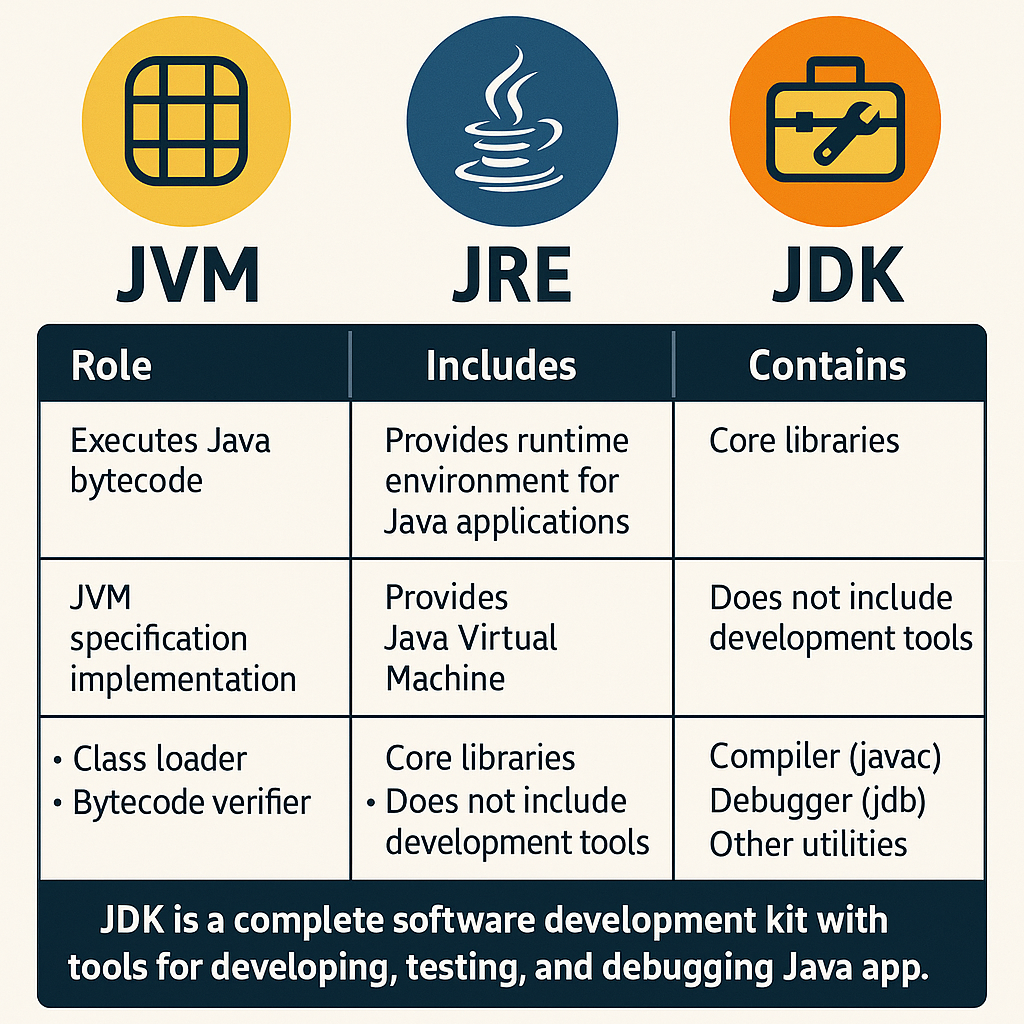If you're getting started with Java or preparing for a Java interview, understanding the roles of JVM, JRE, and JDK is fundamental. This article breaks down the differences, use-cases, and technical implications of each to give you a clear understanding of the Java runtime ecosystem.
🔍 What Are JVM, JRE, and JDK?
| Component | Full Form | Purpose |
|---|---|---|
| JVM | Java Virtual Machine | Executes Java bytecode and provides a runtime environment |
| JRE | Java Runtime Environment | Provides JVM + libraries to run Java applications |
| JDK | Java Development Kit | Provides JRE + development tools (compiler, debugger, etc.) |
🧠 JVM: Java Virtual Machine
📌 Role:
JVM interprets the compiled bytecode (.class files) into machine code specific to the host operating system. It is platform-dependent.
✅ Key Functions:
- Executes Java bytecode
- Provides memory management (heap, stack)
- Ensures security and performance optimization
🧩 Interview Insight:
JVM is not part of Java per se; it's an abstract machine specification. The implementation is provided by vendors like Oracle, OpenJ9, etc.
🧰 JRE: Java Runtime Environment
📌 Role:
JRE is a software package that contains the JVM along with class libraries and other files needed to run Java programs.
📦 Includes:
- JVM
- Core Java libraries
- Other runtime files
📌 When to Use:
Use JRE when you just need to run Java programs, not develop them.
🛠️ JDK: Java Development Kit
📌 Role:
JDK is a superset of JRE and is required for developing Java applications.
🧩 What's Included:
- All from JRE
javac(compiler)javadoc,jar,jshell, and other dev tools
🧪 Real-World Use:
When you install an IDE like IntelliJ or Eclipse, it typically requires JDK for compiling and debugging your code.
🎯 Key Differences
| Feature | JVM | JRE | JDK |
|---|---|---|---|
| Contains Compiler | ❌ | ❌ | ✅ |
| Runs Java Apps | ✅ | ✅ | ✅ |
| Write Java Apps | ❌ | ❌ | ✅ |
| Contains JVM | ✅ | ✅ | ✅ |
| Contains Tools | ❌ | ❌ | ✅ |
🧠 Common Misconceptions
- JVM is platform-independent: No, JVM is platform-specific. It allows Java to be platform-independent because bytecode is the same across platforms.
- JRE is enough for development: No, JDK is needed to compile your code.
💡 Tips and Best Practices
- Always match your JDK version with your build target.
- Use OpenJDK for open-source projects unless you require Oracle-specific enhancements.
- For embedded systems or minimal installs, JRE is lightweight and sufficient.
🧩 Version Relevance
| Java Version | JDK Enhancements | JRE Changes |
|---|---|---|
| Java 8 | Default Compact Profiles | Improved memory handling |
| Java 9+ | JShell, modules support | Minimal JRE distribution |
| Java 11+ | No separate JRE download | JDK includes runtime |
📚 Summary
- JVM is the engine.
- JRE is the runtime box.
- JDK is the full toolkit. Choose based on your role — user or developer.
